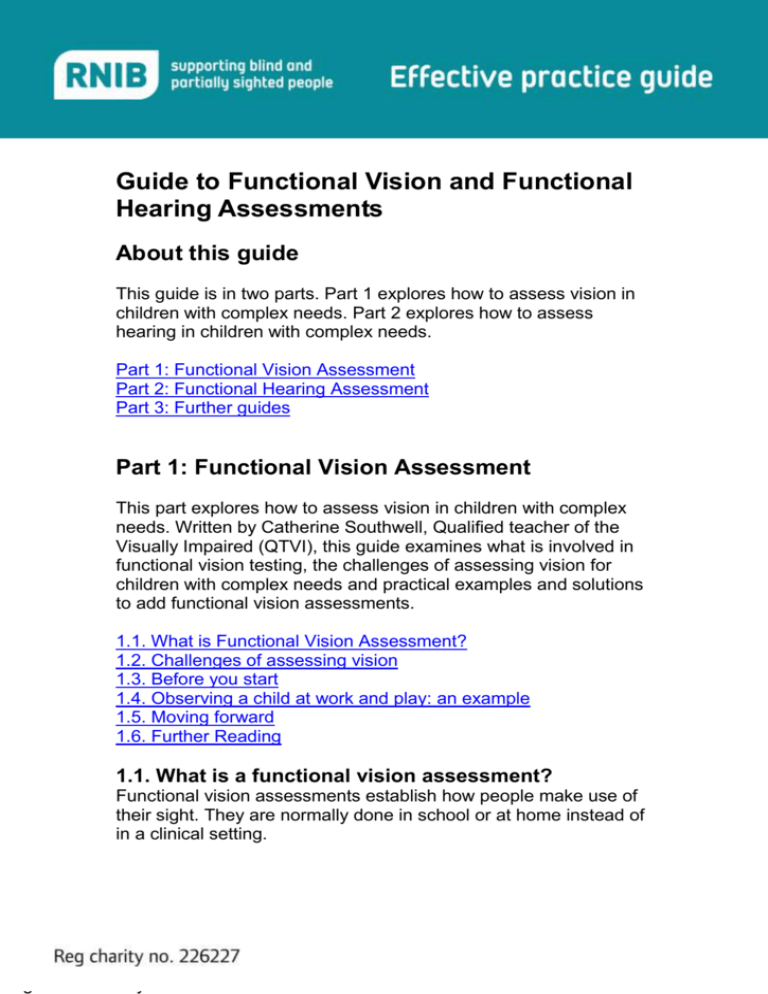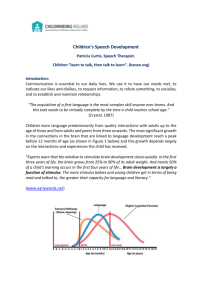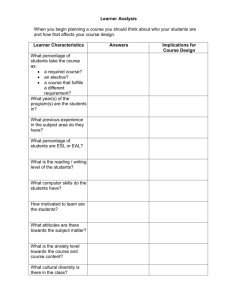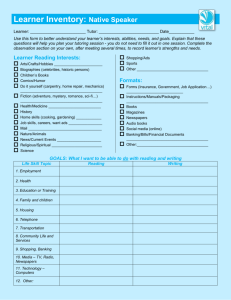cn_functional_vision_assessment_guide
advertisement

RNIB supporting blind and partially sighted people Effective practice guide Guide to Functional Vision and Functional Hearing Assessments About this guide This guide is in two parts. Part 1 explores how to assess vision in children with complex needs. Part 2 explores how to assess hearing in children with complex needs. Part 1: Functional Vision Assessment Part 2: Functional Hearing Assessment Part 3: Further guides Part 1: Functional Vision Assessment This part explores how to assess vision in children with complex needs. Written by Catherine Southwell, Qualified teacher of the Visually Impaired (QTVI), this guide examines what is involved in functional vision testing, the challenges of assessing vision for children with complex needs and practical examples and solutions to add functional vision assessments. 1.1. What is Functional Vision Assessment? 1.2. Challenges of assessing vision 1.3. Before you start 1.4. Observing a child at work and play: an example 1.5. Moving forward 1.6. Further Reading 1.1. What is a functional vision assessment? Functional vision assessments establish how people make use of their sight. They are normally done in school or at home instead of in a clinical setting. Registered charity number 226227 Why do a functional vision assessment? We cannot always tell how much a child sees from looking at their eyes: some children's vision is also affected by cerebral vision impairment (CVI), attention, epilepsy and other factors. An assessment can help to ensure that a child makes the most of whatever sight they have. By observing the child as they go about their daily routine, support staff can see where they might need to make adjustments. 1.2. Challenges of assessing vision Children with Special Educational Needs can be difficult to assess in the clinical setting. A satisfactory result is particularly hard to achieve when a child has significant learning and communication issues. Many children will associate the hospital clinic with previous unpleasant experiences. They may be frightened of the staff uniforms and equipment used, or fractious after spending too long in the waiting room. Many children with learning disabilities are unable to manage the standardised vision tests used to test visual acuity. Conversely, the clinic does not normally identify the visual perception difficulties experienced by many of these children. There is a high incidence of Cerebral Vision Impairment (CVI) among children who have Profound Multiple Learning Disabilities (PMLD), cerebral palsy, epilepsy, or brain injury. These children may experience a range of visual processing disorders. What does an assessment investigate? An assessment should investigate: their ability to recognise objects, pictures, shapes, colours etc perception of movement figure-ground discrimination depth perception how visual attention is affected the capacity to "look and listen", or "look and do". This information will influence teaching approaches and choice of learning materials. Assessment of children with CVI is a lengthy process, more easily carried out at home or school than in a clinical setting. The aim of a functional vision assessment should be to supplement clinical findings, and identify appropriate learning conditions to effectively address the child's needs. 1.3. Before you start Length of time The process of assessing a child in a special school can take quite a long time and is unlikely to be achieved in a single visit. Before planning any structured assessment, it is useful to observe the child in class, and discuss their routines and other issues with the class teacher. Routine Children with complex needs tend to have a busy routine which may include various therapies, medical procedures, personal care and assisted feeding. Variations Epilepsy and its medication can affect levels of wakefulness and cause significant fluctuations in vision. Cerebral palsy often causes acute discomfort as well as reduced motor control. Visual responses will vary according to positioning in terms of comfort, head control and other visual access. It should be possible to see the impact of these factors on the child's visual attention during classroom observation. Environmental factors should be included the assessment report as they are an integral part of "functional vision" - how a child sees in his normal living and working environment. 1.4. Observing a child at work and play: an example For the purpose of this article we shall observe "Tom" in his class for children with PMLD. Visual attention Watching Tom's visual responses during class activities is an effective way to assess his visual skills, provided the observer knows what to look for. It will also reveal issues that relate less directly to visual competency but are nevertheless part of "functional vision" - for example, the amount of time Tom is visually attentive or "on task". Some children will access learning for only a few seconds at a time with long lapses of inattention - usually when they do not have an adult working directly with them. Thus visual learning is severely disrupted, as the child is unable to follow visual sequences (practical demonstrations, games, TV, etc). Observe too the effect of other sensory input on visual attention, especially sounds and music, but also tactile, olfactory and movement sensations. Another difficulty might be that visual responses are much slower than normal. See whether Tom takes longer to notice and recognise objects, or to copy actions (eg waving, smiling, action games) compared with others in the group. Measure the speed of his visual reactions against his response to verbal or sound cues. Responding to people See how Tom responds to people. Does he make eye contact, and smile at a familiar face? Is there any evidence of face recognition by vision alone, without a voice cue? Does he watch a person walking across the room? He might give better visual attention to people with dark hair (good contrast), glasses or jewellery (light reflection). He may prefer to look at a patterned top than the person's face, or perhaps he will stop looking when that person speaks to him. Responding to objects During the learning activity watch carefully to see how Tom responds to objects. See whether he makes a consistent visual response only to bright and reflective objects, or whether he notices low contrast things too. Look at the size of objects he attempts to pick up. Does he observe activity across the room, or only within a close range? Does he respond to things on each side or one side only? When grasping an object, does he keep looking at it while he reaches, or does he look away while reaching? And how does he view things - is his gaze straight and central, or does he view objects eccentrically? Eccentric viewing - using peripheral vision If there is a suitable opportunity, ask if you can put some small objects onto a plain mat, and some onto a patterned background, to see which Tom will notice. "Figure-ground discrimination" seeing an object against a complex background - is often difficult for children with CVI. If the class use pictures or images on the computer monitor or whiteboard, look for evidence of picture recognition. Again, many children with CVI or PMLD can only recognise objects, and are unable to make sense of 2-dimensional images, especially symbols, which are more abstract than photographs. Recognising objects Break time is particularly informative. Look for signs of recognition, eg consistently choosing a favourite piece of fruit. Look at reach and grasp. When a child reaches accurately, positioning the fingers to accommodate the size and shape of the object, we can assume that he has worked out the distance, dimensions and sometimes the purpose of that object before grasping it (watch how a sighted person picks up a cup or hairbrush by the handle). If reaching is approximate, followed by tactile exploration, he is aware of the object, but may not know quite where, or what it is. Does he see what it is? Or just where it is? Use of vision out and about If there is an opportunity to observe outdoor play, look for Tom's response to brighter light and how he adapts to the darker environment as he comes back inside. Observe also whether he watches movement and activity over a greater distance, and shows signs of recognising a familiar person, or responds to someone waving to him. As Tom is ambulant, watch how he negotiates steps, mats, changes of surface colour, and playground equipment. If he has poor depth perception he might confuse a change of surface colour with a step (although this might not always be apparent in a very familiar environment). Does Tom need to stand still in order to look at things, or does he seem to be continually on the move? Some children only notice moving things and will create the illusion of motion by moving themselves. These observations will provide a good baseline from which to plan further observations and a more structured assessment. Try to involve classroom staff by explaining what you are looking for and why. You may want to leave an observation checklist as a guide for Tom's teacher so she can collect more information. 1.5. Moving forward It is important for every supporting adult to be aware of a child's visual abilities and difficulties. The identification of visual perception issues is particularly crucial when considering access to learning. A child with recognition problems will be at a significant disadvantage with visual learning generally, and especially when attempting to use a visual communication system which relies on symbols or pictures. The right information from a functional vision assessment will help the school to design a suitable environment, with appropriate teaching and learning styles, to ensure that every child with a vision impairment has the very best access to learning. 1.6. Further reading For structured functional vision assessment activities please refer to: Assessment of Functional Vision - Children with Complex Needs (Southwell, 2003, RNIB). Best of Both: VI & Orthoptics (Functional and Clinical Vision Assesment) SeeAbilities: Information on functional vision assessment for people with LDD at http://www.seeability.org/ Part 2: Functional Hearing Assessment This part explores how to assess hearing in children with complex needs. We draw on work from Dr Heather Murdoch, who teaches part- time at the MSI Unit at Victoria School in Birmingham and works for the Special Educational Needs and Disability Tribunal as well as being an Honorary Lecturer at the University of Birmingham School of Education. This guide examines the various ways of recording and reporting progress. It is sometimes difficult to know exactly what children with complex needs hear or see. If you work with them in a learning setting, you may need to use particular methods to assess their abilities and record progress. 2.1. Functional hearing assessment 2.2. Identify what you want to know 2.3. Identify how to find out what you want to know 2.4. Further reading 2.1. Functional hearing assessment For children who have hearing problems as well as other disabilities, it's sometimes difficult to know what they do or don't hear. The purpose of a functional hearing assessment is to find out how they use whatever hearing they have. The assessment can find out how a child responds to sounds, and also what the child does with the information they get from sound. This is different for each child, so here are some approaches to try to get an accurate picture. 2.2. Identify what you want to know Rather than ask general questions, for example "how does Fred use his hearing?", it's much easier to get useful answers to specific questions. For example: Is it the noise level that makes Fred so distressed in the dining hall? Does he anticipate snack time from the sounds he hears? Can he recognise his key worker's voice? 2.3. Identify how to find out what you want to know Do you want to know whether Ali can hear a particular sound, or whether he understands its meaning, or something else? You might want to consider the following questions: How do you know if a learner is hearing a sound? What affects how well they can use their hearing? Which sounds do they respond to? What use can they make of the sounds they hear? And, very importantly: What use can you make of the information above? How do you know if the learner is hearing a sound? If you're not sure which sounds the learner hears, you may want to keep a log of their responses to sounds over a month or so. It's important to record what's happening around the learner, as well as the nature of the sound and the response. For example: What did Jane respond to? Where was she? Who was she with? What activity was happening? How did Jane respond? Any special circumstances? Once you've identified the questions to ask about each response, you may want to draw up a grid, so that you can easily see patterns of responses. You may find that the learner responds to sounds after a noticeable delay, which makes it harder to identify what they are responding to. What affects how well they can use their hearing? Many learners with multiple disabilities don't respond consistently to sounds. This may be for a number of reasons: they may have a hearing loss which fluctuates from day to day or hour to hour; they may have learned to ignore sounds which have no meaning for them; their energy and attention may sometimes be taken up by other concerns, such as hunger or pain; they may not be able to hear as well in specific environments. People with hearing impairments are affected far more by background noise than people with full hearing, and learners with multiple disabilities may not be able to choose to listen to relevant sounds rather than irrelevant ones (a skill most people use without even noticing). If you know which factors affect how well the learner can use their hearing, you can adapt your approach accordingly, or at least know when to lower your expectations. For example: hunger, thirst, discomfort, fatigue or pain will diminish a learner's attention to sounds; epilepsy, medication or other health issues may lower hearing levels or create inconsistencies; ear infections, wax or tinnitus may do the same. Other disabilities may create competing demands. For example: walking with poor balance may take all the learner's attention; hearing aids - whether they're prescribed, worn, or working; environmental sounds and distractions - background noise and even visual clutter may affect how well a learner can use their hearing. Trusted adults responding appropriately and consistently will give the learner the best chance of making sense of what they hear. And the familiarity, relevance and motivational power of activities will affect a learner's responses. Which sounds do they respond to? If you are looking to use sounds regularly as part of the learner's day (for example, as cues for activities about to happen), you need to know what types of sounds they hear best and/or prefer. When the learner responds to a specific sound, think about the following aspects: loudness distance and direction pitch (high or low) background noise levels whether it's a voice or environmental sound whether the sound is familiar or unfamiliar. Over time, you can build up a picture of which sounds get the most reliable responses. What use can a learner make of the sounds they hear? A learner may hear a sound but not be able to identify or understand it. Hearing is only the first step. It's equally important to know what use the learner can make of the sounds they hear. The following levels are taken from an article by Deborah Gleason: Awareness An unintentional, reflexive response - for example, a reflex blink to a sudden loud sound. Attention An intentional response that shows the learner knows the sound is there - for example, stilling to listen or vocalising in response to a sound. Localisation Knowing which direction a sound comes from (NB: localisation will not be possible for many learners with hearing losses) Discrimination Knowing whether two sounds are the same or different - for example, a learner who prefers a favourite song is clearly discriminating. Recognition Remembering a sound and its meaning - for example, learners who recognise their spoken name. Comprehension Understanding the implications of a sound - for example, not stepping in the road when you hear a car. Learners will respond at different levels at different times - for example, they are likely to use higher-level responses when they are in good health and highly-motivated. What use can you make of the information gained? You may have begun assessment with one question in mind, but find at the end that you have gathered much more information (and/or that you now have many more questions to ask!) Assessment will have most value if you look to see how you can best use your findings to help the learner understand their world. You might, for example, want to do one or more of the following: Recognise the learner's patterns of response to sound and make sure that everyone working with them does so too. Be aware which factors affect their use of hearing, and in what ways, and change the environment to help the learner use their hearing better. Change elements of how people interact with the learner perhaps by allowing much more time for responses to sounds. Think about how sounds might be used to add motivation to activities, or to provide leisure opportunities. Identify whether specific sounds could be used in a structured way to add to the information the learner receives. 2.4. Further reading Deborah Gleason (1984). "Auditory assessment of visually impaired preschoolers: A team effort." Education of the Visually Handicapped, vol. 16(3), pages 102-113. Heather Murdoch (1994). "He can hear when he wants to!" British Journal of Learning Disabilities vol. 22(3), pages 8589. SENSE: www.sense.org.uk Part 3: Further guides The full Complex Needs series of guides includes: Special Schools and Colleges in the UK Functional Vision and Hearing Assessments Communication: Complex needs Working with complex needs in the classroom The Staff team Understanding complex needs In addition, you may also be interested in the following series of guides, all of which are relevant to children, young people and families: Supporting Early Years Education series Removing barriers to learning series Complex needs series Further and Higher education series We also produce a Teaching National Curriculum Subjects guide, and a number of stand-alone guides, on a range of topics. Please contact us to find out what we have available. All these guides can be found in electronic form at rnib.org.uk/educationprofessionals For print, braille, large print or audio, please contact the RNIB Children, Young people and Families (CYPF) Team at cypf@rnib.org.uk For further information about RNIB Royal National Institute of Blind People (RNIB), and its associate charity Action for Blind People, provide a range of services to support children with visual impairment, their families and the professionals who work with them. RNIB Helpline can refer you to specialists for further advice and guidance relating to your situation. RNIB Helpline can also help you by providing information and advice on a range of topics, such as eye health, the latest products, leisure opportunities, benefits advice and emotional support. Call the Helpline team on 0303 123 9999 or email helpline@rnib.org.uk If you would like regular information to help your work with children who have vision impairment, why not subscribe to "Insight", RNIB's magazine for all who live or work with children and young people with VI. Information Disclaimer Effective Practice Guides provide general information and ideas for consideration when working with children who have a visual impairment (and complex needs). All information provided is from the personal perspective of the author of each guide and as such, RNIB will not accept liability for any loss or damage or inconvenience arising as a consequence of the use of or the inability to use any information within this guide. Readers who use this guide and rely on any information do so at their own risk. All activities should be done with the full knowledge of the medical condition of the child and with guidance from the QTVI and other professionals involved with the child. RNIB does not represent or warrant that the information accessible via the website, including Effective Practice Guidance is accurate, complete or up to date. Guide updated July 2014






